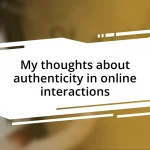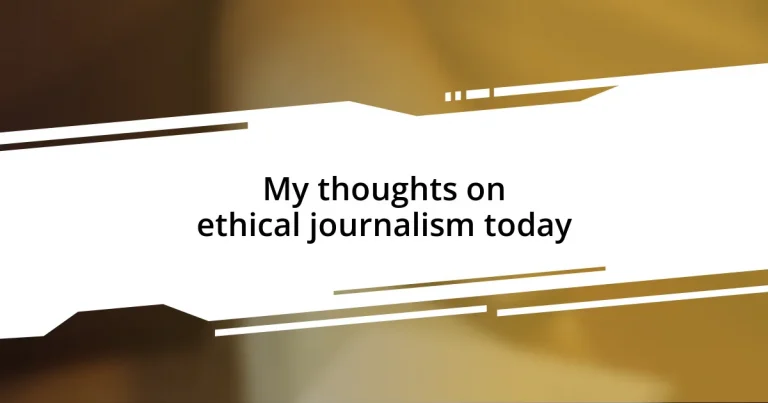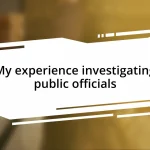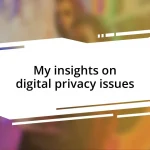Key takeaways:
- Ethical journalism hinges on accuracy, fairness, and independence, crucial for building trust and credibility.
- Challenges include rapid content production, misinformation spread, and safety concerns in sensitive environments.
- Transparency and the ethical use of technology, especially AI, are essential for maintaining journalistic integrity.
- Ongoing ethical training for journalists is vital to navigate the complexities of modern reporting and uphold standards.
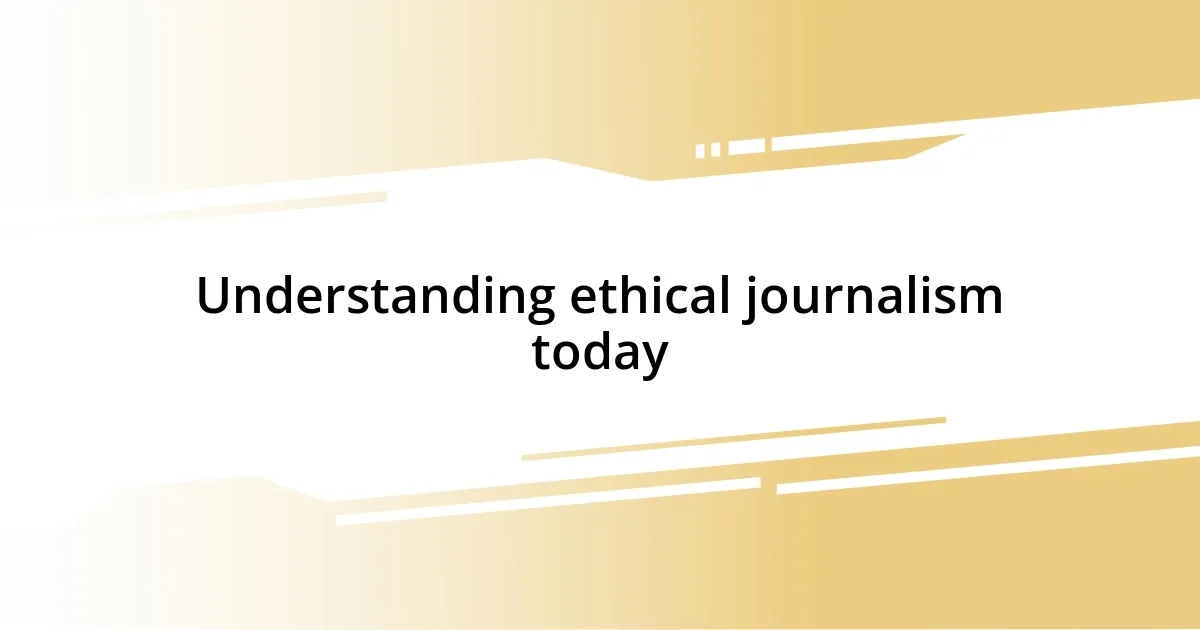
Understanding ethical journalism today
Understanding ethical journalism today requires navigating a complex landscape where integrity often meets pressure. I’ve personally observed instances where journalists faced pushback from stakeholders eager to sway narratives. It makes you wonder, how can a reporter maintain objectivity in an age where opinions often overshadow facts?
In my experience, the rise of social media has transformed journalism profoundly. I remember feeling a mix of excitement and anxiety when I first shared my articles online. The immediate feedback was exhilarating, but it raised a crucial question: how do we ensure the information we share is not only accurate but also respectful of those involved? This moment taught me the weight of responsibility that comes with the power of the press.
Moreover, I often find myself reflecting on the role of transparency in ethical journalism. When writing about sensitive topics, disclosures about sources and potential conflicts of interest can make or break credibility. It prompts me to ask, how transparent do we really need to be? For me, striving for honesty in every story is not just a principle; it’s a commitment to the truth, ensuring that the voices of the marginalized are heard and respected in the narratives we choose to tell.
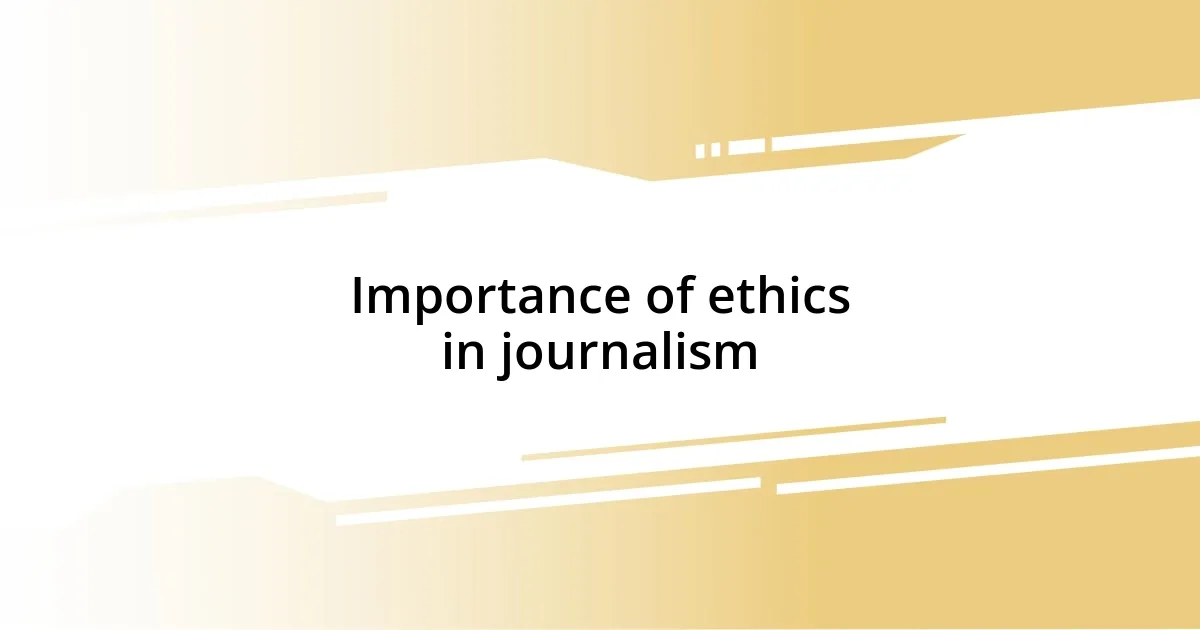
Importance of ethics in journalism
Ethics in journalism serve as the backbone of credible reporting. I’ve witnessed how a journalist’s dedication to ethical practices can build trust within communities, especially when covering delicate issues. For instance, while working on a piece about local environmental activism, I realized that presenting both sides fairly not only honored those involved but also helped me gain the trust of the community. This trust is vital, as it allows for open dialogues that foster understanding amidst differing opinions.
Here’s why ethical journalism matters:
– Trustworthiness: Ethical standards enhance the credibility of the news source.
– Public Accountability: Journalists act as a watchdog for society, holding those in power accountable.
– Informed Citizenry: Upholding ethics ensures that people receive accurate information, enabling them to make informed decisions.
– Respect for Individuals: Ethical considerations protect the dignity and privacy of those depicted in stories.
– Long-term Relationships: Fostering trust with audiences leads to stronger engagement over time.
Each of these components underscores the essential role of ethics in not just maintaining journalistic standards, but also shaping a more informed and empathetic society.
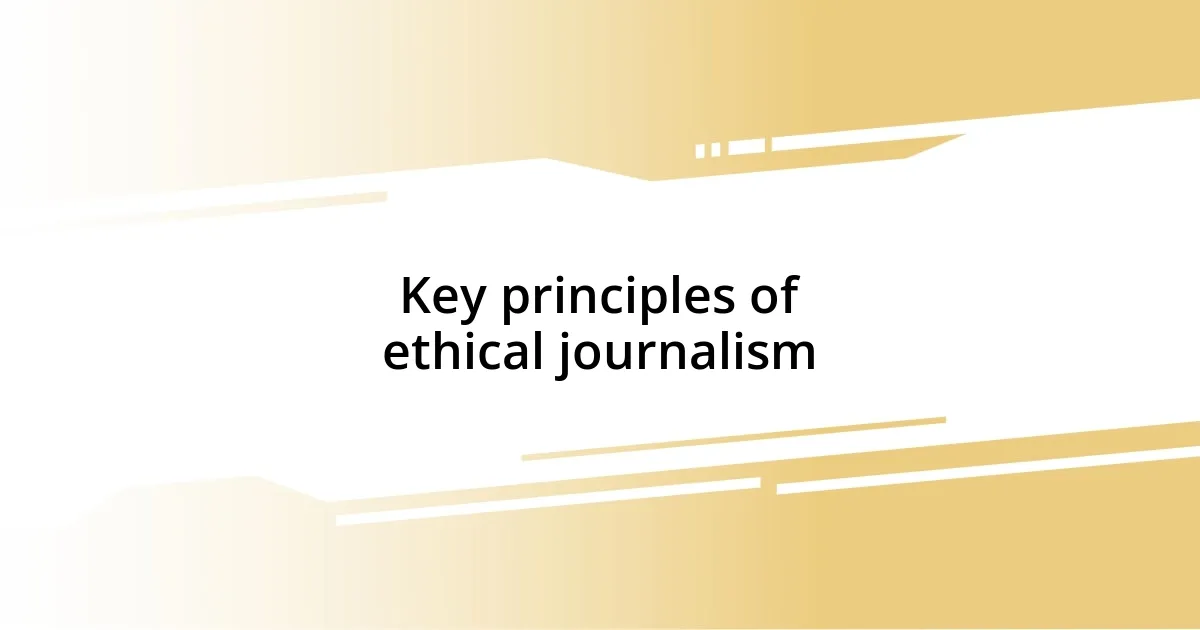
Key principles of ethical journalism
When I think about the key principles of ethical journalism, accuracy stands out as paramount. I’ve often felt the pressure to sensationalize stories to attract more attention, but I’ve learned that prioritizing truth is what ultimately matters. Each time I’ve taken extra steps to verify facts, I’ve seen how the audience not only appreciates the reliable information but feels respected in the process. Building a reputation on accuracy isn’t just beneficial; it’s essential for a journalist’s integrity.
Another important principle is fairness, which extends beyond simply presenting both sides of a story. I remember covering a community clash where I aimed to include perspectives from all involved. It was eye-opening to see how an effort to understand different viewpoints cultivated respect among readers—perhaps even leading to constructive discussions. When journalists strive for equity in representation, it creates a deeper connection with the public, inviting more nuanced conversations.
Lastly, independence in journalism is crucial as it shields the integrity of reporting from external influences. I’ve found myself in situations where my sources attempted to sway the narrative, and standing firm on my independence was challenging yet vital. Each time I chose to prioritize my ethical standards over external pressures, I recognized that my credibility—and my relationship with readers—depends on maintaining that independence. It’s empowering to know that we can be advocates for truth, free from bias.
| Key Principle | Description |
|---|---|
| Accuracy | Ensuring all facts and details presented in reporting are correct and verified. |
| Fairness | Presenting all sides of a story equitably to honor diverse perspectives and encourage dialogue. |
| Independence | Maintaining autonomy from external influences to safeguard the integrity of journalism. |
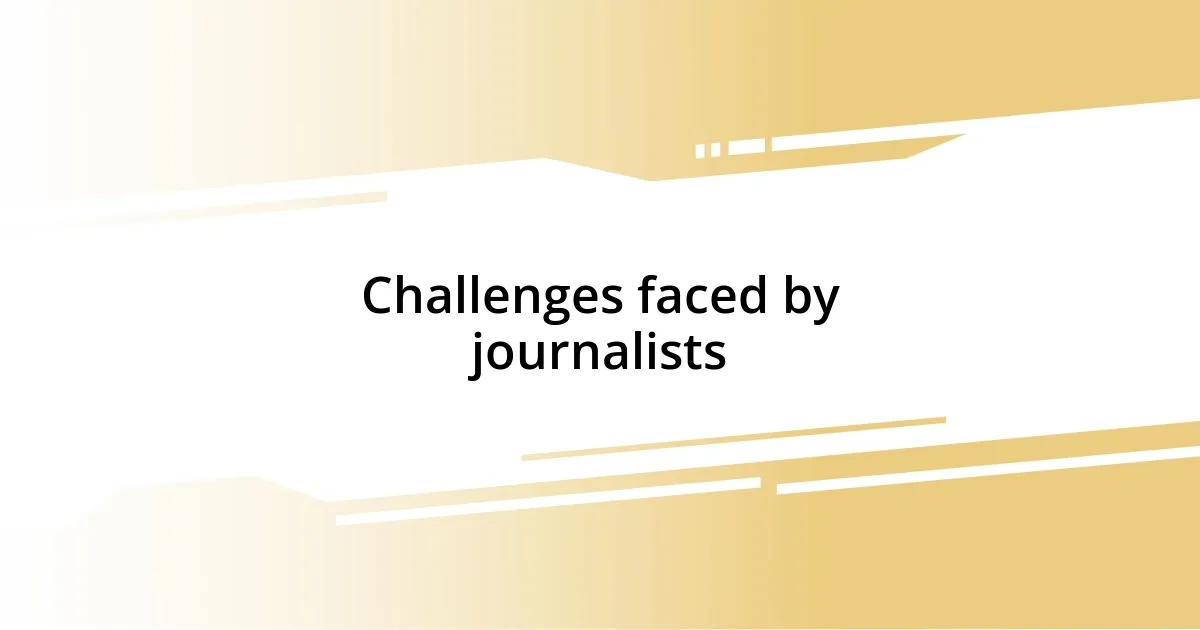
Challenges faced by journalists
Navigating the modern landscape of journalism poses significant challenges. One of the most pressing issues I’ve observed is the growing pressure to produce content rapidly. In my experience, when deadlines loom, it’s easy to sacrifice thorough fact-checking for the sake of speed. This not only compromises the integrity of the story but also erodes trust with the audience. Have you ever wondered how many important details might slip through the cracks in the rush?
Another challenge is the pervasive influence of misinformation. I’ve encountered situations where I had to debunk widely circulated myths, which can sometimes feel like shouting into a void. It’s disheartening to see false narratives gain traction, and the responsibility falls heavily on journalists to clarify facts. This battle against misinformation requires not just determination but a strategic approach to ensure the truth reaches the people. How can we effectively combat such widespread confusion?
Moreover, journalists frequently grapple with safety concerns, especially in politically sensitive or conflict-driven environments. I recall a time when I covered a protest, and the tension in the air was palpable. I felt an adrenaline rush mixed with anxiety, knowing that tensions could escalate in an instant. It really makes you reflect on the risks we take to share vital stories, doesn’t it? The courage to persevere in the face of potential danger speaks volumes about the commitment many journalists have to their craft and the communities they serve.
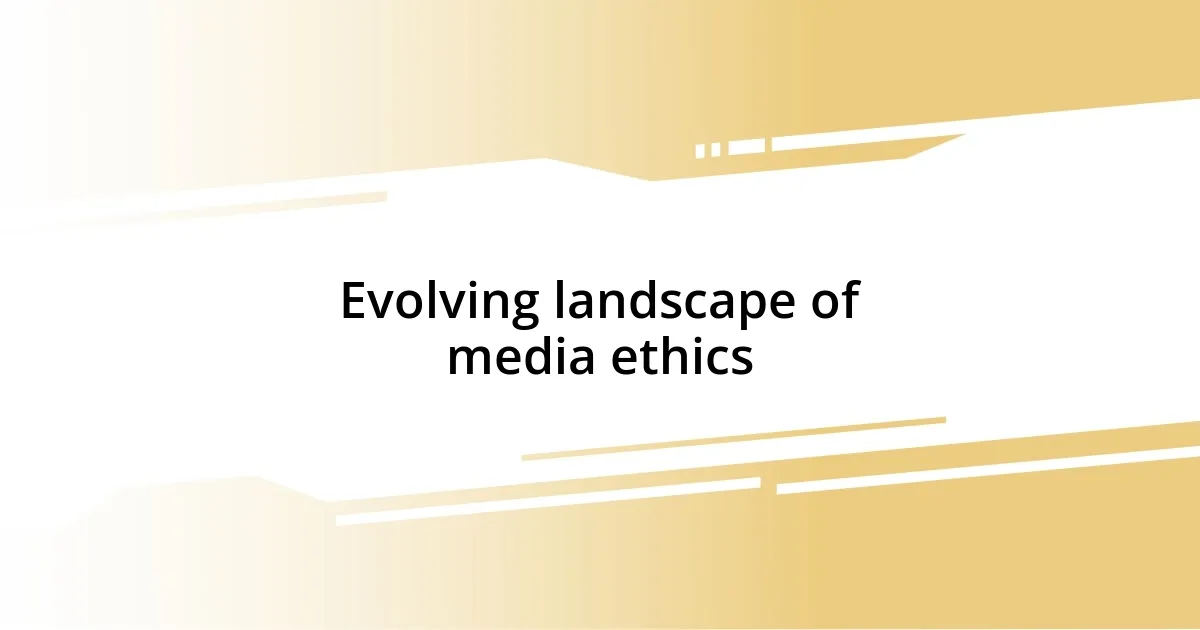
Evolving landscape of media ethics
The landscape of media ethics is continually shifting, and it’s fascinating to witness how technology plays a role in this evolution. Social media platforms have not only democratized information sharing but also escalated the standards of accountability journalists must uphold. I remember when I first started sharing my work online; the instant feedback was both a thrill and a challenge. How do we ensure we maintain our ethical standards in a space where anyone can share anything at any time? It often feels like we’re walking a tightrope.
In my experience, transparency has emerged as a cornerstone of modern media ethics. Readers today demand to know where information comes from, and I’ve started to incorporate footnotes and source citations in my articles. This not only bolsters my credibility but encourages a culture of honesty within journalism. Have you ever noticed how much more trust you feel towards a writer who openly shares their sources? It becomes a tie that binds the journalist and audience together, fostering respect and understanding.
Furthermore, the rise of artificial intelligence and algorithms in news dissemination challenges the traditional ethical framework. I find myself reflecting on how these technologies can reinforce biases rather than eliminate them. It raises an important question: are we prepared to address the ethical implications of relying on AI in reporting? Drawing from my experiences in newsrooms, I often emphasize the need for human oversight to ensure that our ethical standards aren’t lost in the automation process. This balance between innovation and integrity will be essential in shaping the future of journalism.
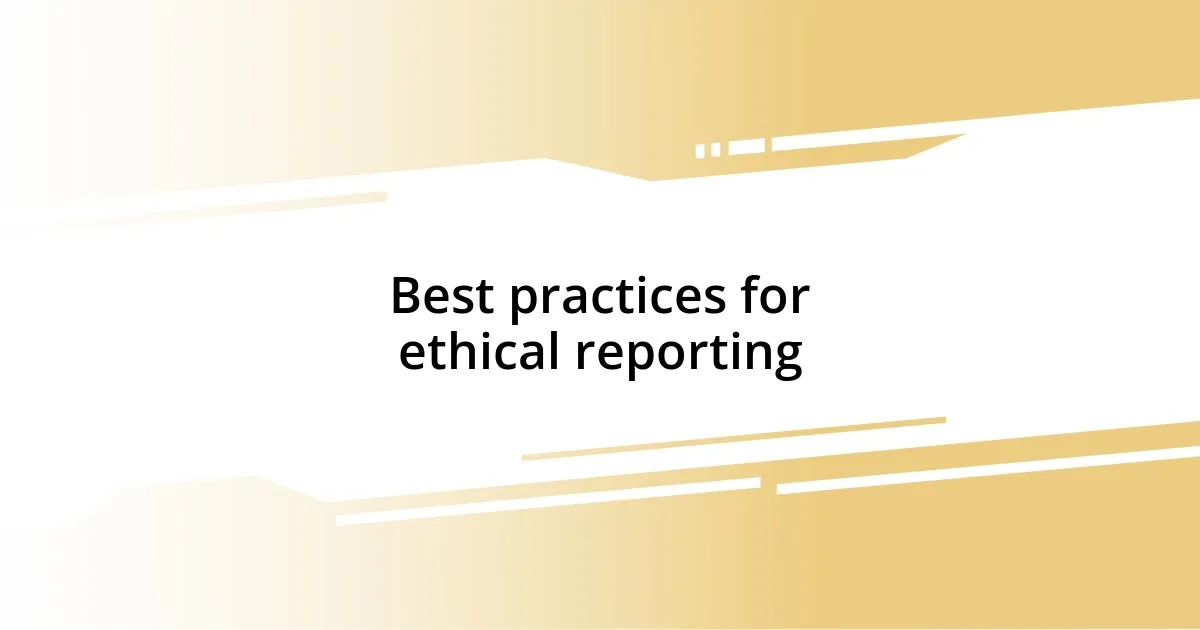
Best practices for ethical reporting
Ethical reporting requires a commitment to accuracy above all else. I remember an experience where I was about to publish a story covering a local controversy, but something didn’t sit right with me. I decided to dig deeper, and my persistence unearthed critical facts that changed the narrative entirely. This taught me that taking the time to verify information can transform not just a story but also how the public perceives an issue. Have you ever considered how a single fact can alter the course of a discussion?
Another best practice is to prioritize the voices of those most affected by the story. I once interviewed a community leader about a significant policy change, and their perspective brought a human face to the statistics. It reminded me of the immense responsibility we have to represent the people in our stories authentically. How often do we ask ourselves if we’re truly capturing the lived experiences of those we report on? Focusing on diverse voices not only enriches our journalism but also fosters a deeper understanding among our readership.
Finally, maintaining a clear boundary between reporting and advocacy is crucial. I remember a colleague who, after covering a series of environmental crises, became emotionally invested and began to blur those lines. While passion is vital, I learned that our role is to inform, not to influence outcomes directly. How can we ensure that our biases don’t seep into our reporting? Upholding this distinction not only preserves our integrity as journalists but also helps maintain the trust our audience places in us.
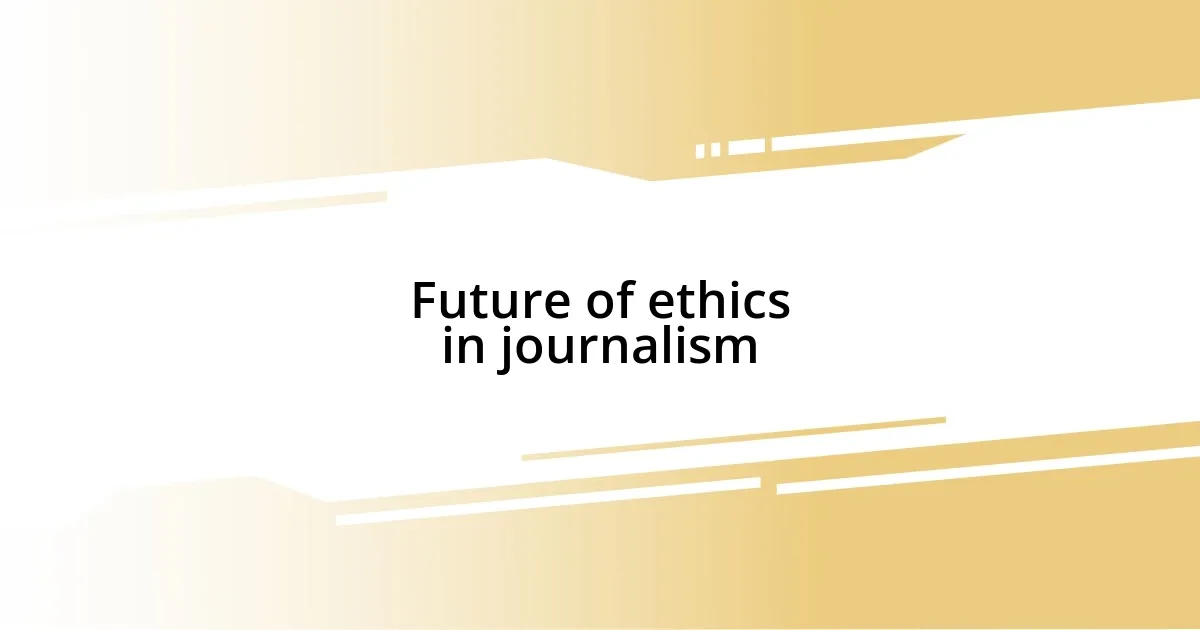
Future of ethics in journalism
The future of ethics in journalism is undoubtedly tied to the evolving role of technology. I recall a recent instance where a fact-checking tool I used completely changed my approach to reporting. It highlighted how much faster we can now verify information, yet I wonder: does speed compromise accuracy? Striking a balance between the two is crucial. Moving forward, I’m convinced that any advancement in tools must be matched by a rigorous commitment to ethical standards.
As I reflect on the growing influence of social media, I see a double-edged sword in how it shapes public perception. Just the other day, a tweet I posted went viral overnight, bringing with it an avalanche of opinions—some constructive, some destructive. I found myself questioning how such platforms can distort narratives. With the power of virality comes an immense responsibility. How do we, as journalists, navigate this space without losing sight of the facts?
Looking ahead, one of the most pressing issues will be the ethical training of journalists in this new landscape. In a workshop I attended recently, I was struck by the discussions surrounding the need for ongoing education in ethics. Many young journalists seem unsure about the gray areas of moral responsibilities in reporting. Are we equipping emerging professionals with the tools they need to handle these complexities? As I mentor aspiring writers, I emphasize the importance of anchoring their work in ethical principles, ensuring that they’re not just storytellers but also guardians of integrity in their craft.








